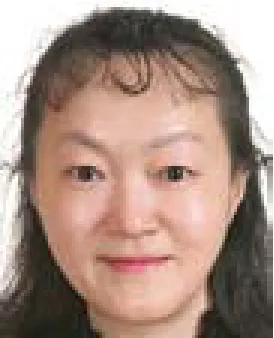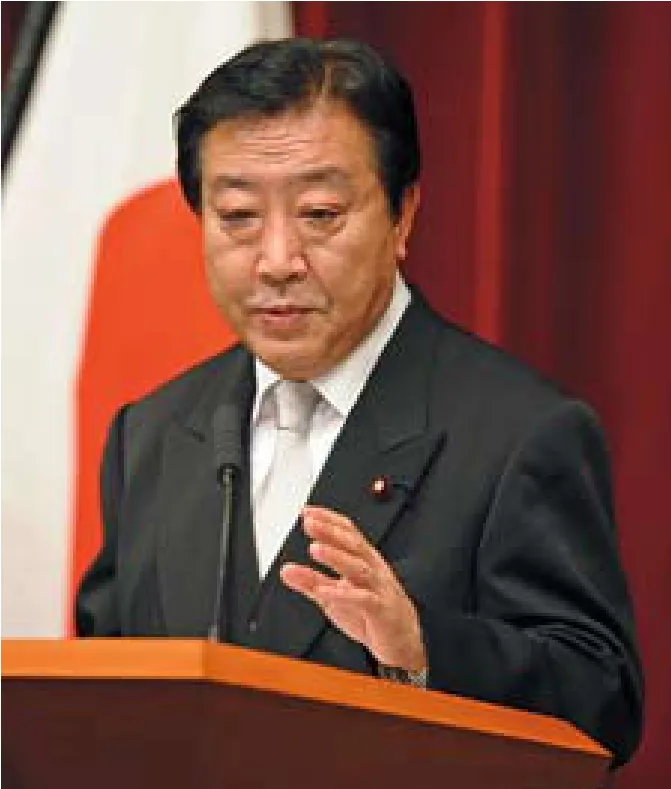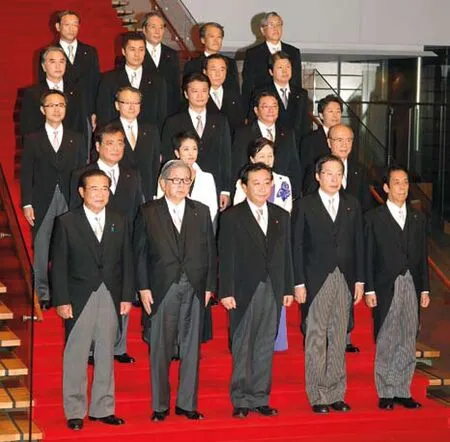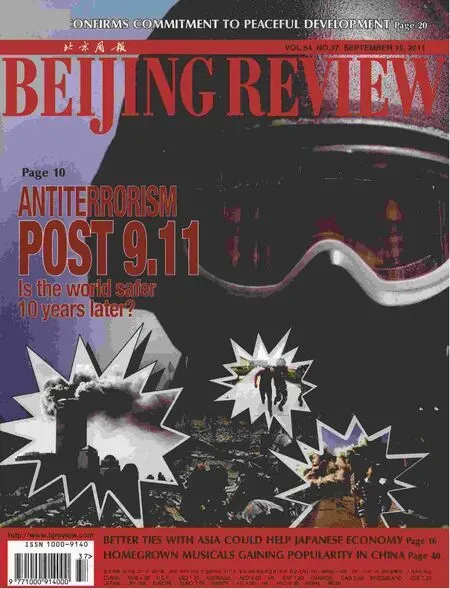Will Noda Shift Japan’s China Policy?
2011-10-14ByZHANGYAOHUA
By ZHANG YAOHUA
Will Noda Shift Japan’s China Policy?
By ZHANG YAOHUA
Better ties with China could help Japan’s economic recovery

The Japanese political merrygo-round has spun out yet another new prime minister. On August 30, Yoshihiko Noda replaced Naoto Kan to become Japan’s third prime minister in the last two years and sixth in the last fi ve years. Observers are curious about Noda’s diplomatic policy because he was previously the finance minister and rarely commented on diplomacy. Noda’s inappropriate attitude about Japanese history, however, has made people worry about his future Asian policy—he once said World War II Class A criminals were not sinners.
The constant changes in the prime minister’s office have caused constant shifts in Japanese foreign policy. Whether Noda’s diplomatic policy can become more reasonable and consistent will have a great bearing on the stability of the whole of East Asia.
Relations under Hatoyama
In 2009, the Democratic Party of Japan(DPJ) won the country’s parliamentary election, ending decades of rule by the Liberal Democratic Party (LDP). While maintaining the U.S.-Japanese alliance,then Prime Minister Yukio Hatoyama stressed the independence of Japan’s diplomacy and called for an equality-based relationship with the United States.
Hatoyama also paid greater attention to Asia, advocating balanced diplomacy between the United States and China.Under pressure from voters, the Hatoyama government urged the United States to relocate its Futenma air base in Japan’s Okinawa Prefecture. Also, Hatoyama boosted Japan’s relationship with China,while promoting the development of an East Asian Community.
Hatoyama’s diplomatic adjustment seriously disturbed Washington’s Asian strategy. In response, the United States launched a publicity campaign to remind Japan of the importance of the U.S.-Japanese security alliance. While pressuring the Hatoyama administration, Washington also portrayed China’s emergence as a regional threat. When Hatoyama was forced to resign, both his promise to pull the U.S. air base out of Okinawa and the DPJ’s independent diplomacy came to an end.
Hatoyama’s failure led to Kan’s administration returning to the traditional U.S.-Japanese alliance. The return also created conditions for Washington dealing with China’s rise by using the alliance.
Kan returns to business as usual
China initially had some hope for better relations with Kan’s administration.Some Chinese observers believed Kan would be more willing to push the Sino-Japanese relationship forward, because he had headed several DPJ delegations to China, and had played an active role in promoting bilateral cooperation.
The Sino-Japanese relationship was good during the initial period of Kan’s administration. The DPJ insisted on the four basic political documents between the two countries, which respectively were signed in 1972, 1978, 1998 and 2008, so as to maintain the continuity of the Sino-Japanese “strategic relationship of mutual bene fi t.”
The DPJ also showed a positive attitude on historical issues during Kan’s time. Kan required that all his cabinet members not visit the controversial Yasukuni Shrine,which commemorates Japanese war dead,including Class A war criminals in World War II, on August 15, the date Japan announced its surrender in 1945.
Kan made a telephone call to Chinese Premier Wen Jiabao a week after he assumed power in June 2010, inaugurating the hotline between the two countries’heads of government. He also named Uichiro Niwa, former President of trading company Itochu Corp., as Japanese ambassador to China, intending to show an emphasis on promoting bilateral trade and economic relations. Niwa is experienced in international business and has good connections with Chinese political and business circles.

CHALLENGES AHEAD: New Japanese Prime Minister Yoshihiko Noda speaks at a news briefing in Tokyo on September 2
But things changed after the DPJ lost its majority in last July’s upper house election. Kan decided to cement the DPJ’s ruling position by adjusting diplomatic policy. He abandoned the independent and balanced diplomatic strategy, restored the U.S.-Japanese alliance, focused on Japanese-South Korean relations as the core of Japan’s Asian diplomacy, and kept a distance from China.
The Kan government also mounted pressure on North Korea over the nuclear issue, North Korea’s abductions of Japanese citizens in the 1970s and the 1980s and the sinking of South Korea’sCheonanwarship in March 2010, for which Seoul put the blame on Pyongyang.These steps refocused Japan on security cooperation between Tokyo, Washington and Seoul.
Washington weighed much more on Kan’s diplomatic scales. His China policywas adjusted along with his U.S. policy.Also, he treated the U.S.-Japanese alliance as a tool to hold down China’s increasing power. For example, Kan once declared that the U.S. military presence in Japan is playing a role in deterring China. He also regarded China as a threat that Japan should be alert of, which brought the DPJ diplomatic strategy in line with that of the LDP. Thereafter, many Japanese politicians joined the U.S. chorus of the “China threat theory.”

MORE NEW FACES: Yoshihiko Noda’s cabinet makes its first group appearance in Tokyo on September 2
On September 7, 2010, Japanese coast guards captured a Chinese fishing boat near the Diaoyu Islands in the East China Sea. Japan illegally arrested the captain and began an investigation of the incident.It was not until two weeks later that the Japanese authorities finally released the captain after intensive diplomatic mediation. Japan’s unusually harsh stance on this issue reflected the Kan administration’s changed policy.
Relying on the U.S.-Japanese alliance,the Kan administration sought to build a strategic alliance to hedge against China through cooperation with other neighbors.This policy resulted in growing discord in the two countries’ relations, which greatly shook the foundation of their mutual trust.
Noda’s direction uncertain
Noda became prime minister at a crucial moment. Since the DPJ needs to iron out internal disputes among different factions to cement its ruling position and lead Japan in addressing the aftermath of the devastating earthquake and tsunami in March, diplomacy is not Noda’s most urgent task. Maintaining the DPJ’s ruling position and promoting post-disaster recovery are more important to him.
Most likely, the Noda cabinet will follow Kan’s policy and consider its relationship with Washington as its top diplomatic priority. But Noda definitely can do more on the Sino-Japanese relationship. Now he must make a choice between Kan’s strategy of deterring China and building a stable partnership with China.
Japan’s economy is at a key point. China has become Japan’s top trade partner and importer, so a tough policy on China is not in accord with Japan’s interests. Even if Noda hopes to strengthen Japan’s alliance with Washington, as a former fi nance minister, he will not ignore China’s role in helping revive the Japanese economy. But wrong opinions on historical issues and China’s future development may bring uncertainties to Noda’s future policy on China.
The next year will mark the 40th anniversary of the normalization of Sino-Japanese diplomatic relations, which could mean a new opportunity to improve their bilateral relationship. But the damage caused by Japan’s interception of a Chinese fi shing boat off the Diaoyu Islands last year has yet to be mended.
Also, Washington never stops deploying its strategy of balancing China’s influence in East Asia. As long as disputes between China and Japan exist,Washington can use these disputes to work for its East Asian strategy.
Noda’s fi rst priorities will be to consolidate the position of the DPJ and his own status as prime minister. If he can do them,he will be in a better position to promote post-earthquake reconstruction and rebuild Japan’s stagnant economy. Strengthening cooperation with emerging economies including China can help Noda accomplish these goals.
Even if Noda hopes to strengthen Japan’s alliance with Washington,as a former finance minister, he will not ignore China’s role in helping revive the Japanese economy
The author is an associate research fellow with the China Institute of International Studies
